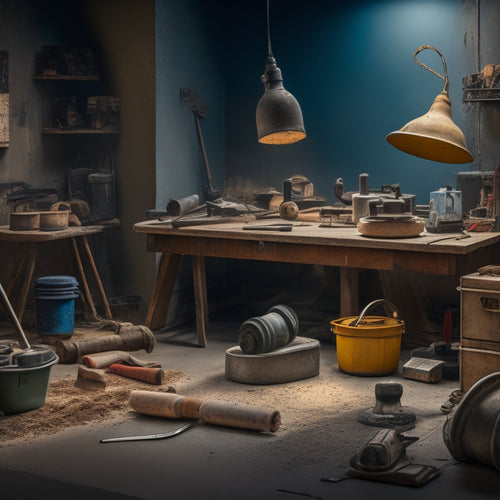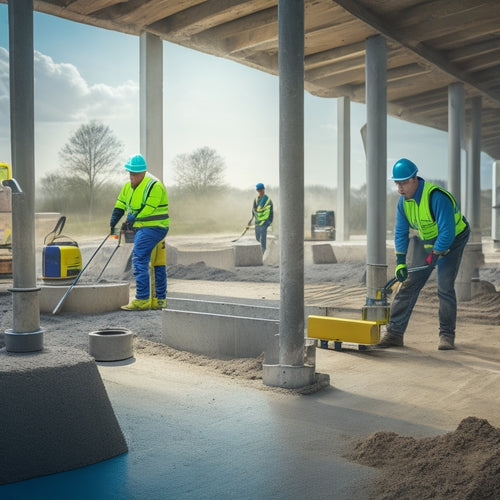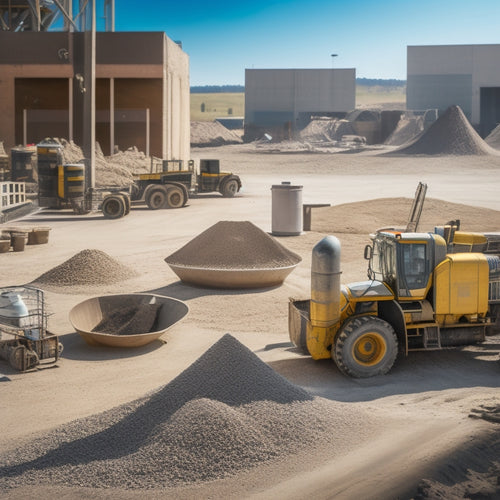
Top Tools for Pro Concrete Wall Construction
Share
You'll need a thorough arsenal of specialized tools to tackle complex concrete wall construction projects. From essential hand tools like trowels and formwork essentials to power tools such as drill presses and cutting systems, each plays a significant role in ensuring accuracy and efficiency. Safety equipment like personal protective gear, steel-toed boots, and safety glasses are also important for protecting yourself on-site. Additionally, measuring and testing devices, mixing and finishing tools, and specialized tools for complex walls will help you achieve precise and high-quality results. As you explore the world of concrete wall construction, you'll uncover even more tools and techniques to elevate your craft.
Key Takeaways
• Essential hand tools like trowels, formwork essentials, and finishing tools are crucial for achieving a smooth, high-quality concrete finish.
• Power tools like drill presses and cutting systems streamline processes, reduce labor costs, and enhance efficiency in concrete construction.
• Safety equipment such as personal protective gear, steel-toed boots, and safety glasses are vital for protecting workers from hazards on the job site.
• Measuring and testing devices like laser levels, calibration tools, and structural integrity tools ensure accurate measurements and high-quality concrete walls.
• Specialized tools like curved formwork systems, customizable wall reinforcement systems, and 3D printing and scanning tools enable the creation of complex, unique, and intricate concrete wall designs.
Essential Hand Tools for Concrete
You'll need a set of essential hand tools to guarantee efficient and effective concrete wall construction, starting with a sturdy trowel for scooping and spreading concrete. Mastering trowel techniques is critical, as it guarantees a smooth, even finish. Invest in a high-quality trowel with a durable handle and a rust-resistant blade.
Next, familiarize yourself with formwork fundamentals, including the assembly and disassembly of forms. A level, hammer, and tape measure are must-haves for precise formwork alignment and layout.
Don't overlook the importance of an edger, jointer, and float, which are fundamental for finishing and detailing concrete surfaces. Additionally, a mixing bucket, mixing stick, and finishing trowel will come in handy for mixing and applying concrete.
With these hand tools in your arsenal, you'll be well-equipped to tackle concrete wall construction with confidence and precision. By mastering the techniques and fundamentals associated with these tools, you'll be able to produce high-quality concrete walls that meet the highest standards of craftsmanship.
Power Tools for Efficient Building
As you shift to power tools for efficient building, you'll want to focus on maximizing precision and speed.
You'll achieve this by utilizing a drill press that guarantees accuracy in hole placement and diameter, particularly essential when working with concrete.
Next, you'll explore efficient cutting systems that streamline the process and reduce labor costs.
Drill Press Accuracy
When building concrete walls, achieving accurate hole placement and precise drilling is vital, and a drill press offers the stability and control necessary to deliver consistent results.
To ascertain your drill press is up to the task, you'll want to prioritize drill press calibration. This process involves adjusting the machine's settings to confirm precise drilling depths and angles.
Regular drill press maintenance is also important, as it prevents wear and tear that can compromise accuracy. Make certain to clean the drill press regularly, lubricate moving parts, and replace worn-out components as needed.
Efficient Cutting Systems
What characterizes an efficient cutting system is its ability to make precise cuts quickly and safely, thereby optimizing your concrete wall construction workflow. As a professional, you understand the importance of minimizing downtime and maximizing productivity. An efficient cutting system enables you to do just that.
Here are some key features to look for in an efficient cutting system:
-
Wire saws: These versatile saws use a diamond-impregnated wire to make precise cuts in concrete, perfect for complex shapes and curves.
-
Diamond blades: Designed for high-performance cutting, diamond blades are ideal for making straight cuts in concrete, masonry, and asphalt.
-
Dust suppression systems: These systems minimize dust and debris, ensuring a safer working environment and reducing cleanup time.
When selecting an efficient cutting system, consider the type of cuts you need to make, the material you're working with, and the level of precision required. By investing in the right cutting system, you'll be able to complete projects faster, safer, and with greater accuracy.
Safety Equipment for Concrete Work
As you prepare for concrete wall construction, you'll need to prioritize your safety above all else.
You'll be working with heavy materials, powerful tools, and potentially hazardous substances, so it's vital that you're equipped with the right personal protective gear.
From hard hats to gloves, you'll want to make certain you have the essential safety equipment to prevent injuries and protect yourself from harm.
Personal Protective Gear
You must wear personal protective gear (PPE) specifically designed for concrete work to prevent injuries from hazardous materials, heavy equipment, and physical demands inherent to the job.
As a concrete wall construction professional, you understand the importance of safety protocols to minimize risks and guarantee a successful project. Your protective clothing should be durable, comfortable, and suitable for the task at hand.
Here are some essential PPE items to include in your concrete work arsenal:
-
Steel-toed boots: Protect your feet from heavy objects, sharp edges, and crushing injuries.
-
Chemical-resistant gloves: Prevent skin irritation and injury from harsh chemicals and materials.
-
Safety glasses with anti-fog coating: Guarantee clear vision and protection from flying debris, dust, and chemical splashes.
Hard Hat Essentials
Your hard hat is a vital component of your personal protective gear, serving as a barrier between your head and falling objects, debris, and electrical hazards on the concrete wall construction site.
It's important to choose a hard hat that meets industry standards and hard hat regulations, such as those set by OSHA and ANSI. When selecting a hard hat, consider factors like impact resistance, penetration resistance, and electrical insulation.
Regular hard hat maintenance is also important to guarantee its effectiveness. You should inspect your hard hat daily for signs of damage, such as cracks, dents, or fading.
Clean your hard hat regularly with mild soap and water, and avoid exposing it to extreme temperatures or chemicals. Additionally, replace your hard hat every 5 years or sooner if it has been damaged or exposed to hazardous conditions.
Measuring and Testing Devices
Accuracy demands precise measurements, and concrete wall construction relies heavily on a range of measuring and testing devices to confirm structural integrity and quality.
You understand that even minor deviations can lead to costly rework or, worse, compromise the structure's safety. To ascertain accuracy, you'll need the right tools for the job.
Here are some essential measuring and testing devices you should have in your kit:
-
Laser levels: These precision instruments project a level line or plane, enabling you to check and adjust your walls with ease.
-
Calibration tools: Regularly calibrate your measuring devices to prevent errors and ensure that your readings are reliable.
-
Digital inclinometers: These tools measure the angle of inclination, helping you detect even slight deviations from the planned design.
Mixing and Finishing Tools
With the measuring and testing phase complete, it's time to focus on mixing and finishing tools that guarantee a strong, durable, and visually appealing concrete wall. As a pro, you know that proper mixing and finishing are vital to achieving the desired results.
Here are some important mixing and finishing tools you should have in your arsenal:
| Tool | Description | Purpose |
|---|---|---|
| Concrete Mixer | A machine that combines cement, water, and aggregate | To mix concrete to the right consistency |
| Tamping Tool | A handheld or mechanical tool that compacts concrete | To remove air pockets and guarantee a solid finish |
| Finishing Trowel | A flat, handheld tool used to smooth and finish concrete | To achieve a smooth, even surface |
When it comes to mixing techniques, it's important to follow the correct procedures to guarantee the right consistency and strength. Finishing methods, such as floating and troweling, are also significant in achieving the desired texture and appearance. By mastering these techniques and using the right tools, you'll be able to produce high-quality concrete walls that meet your clients' expectations.
Specialized Tools for Complex Walls
When constructing complex walls with unique shapes, angles, or features, you'll need specialized tools to secure precision and quality. These walls often require advanced formwork techniques and customized wall reinforcement, which can be challenging to execute without the right equipment.
Here are some must-have tools for complex wall construction:
-
Curved formwork systems: These allow you to create curved walls and surfaces with precision and accuracy.
-
Customizable wall reinforcement systems: These enable you to design and build walls with complex reinforcement patterns, securing strength and stability.
-
3D printing and scanning tools: These cutting-edge technologies enable you to create complex wall shapes and features with unparalleled accuracy and precision.
With these specialized tools, you'll be able to tackle even the most intricate wall designs and secure that your final product meets the highest standards of quality and precision.
Frequently Asked Questions
How Do I Prevent Concrete From Sticking to My Tools and Equipment?
To prevent concrete from sticking to your tools and equipment, you're going to want to focus on preventing adhesion.
You can do this by applying specialized tool coatings that reduce the surface energy of your tools. This makes it harder for the concrete to bond with them.
Look for coatings specifically designed for concrete work, such as silicone or Teflon-based products.
Can I Use Concrete Tools for Other Masonry Projects Like Bricklaying?
'Mastering masonry magic' starts with versatility in your toolset.
You're wondering if concrete tools can crossover to bricklaying and other masonry techniques. The answer is, it depends. While some tools, like trowels and levels, are compatible across projects, others, like finishing floats, are specific to concrete.
Research tool compatibility to guarantee a seamless shift.
Don't compromise on quality - invest in tools that cater to each masonry discipline for exceptional results.
What Is the Best Way to Clean and Maintain Concrete Tools?
You understand the importance of tool maintenance to extend their lifespan and performance.
When it comes to cleaning your concrete tools, you'll want to adopt effective cleaning techniques to remove stubborn concrete residue.
Start by scraping off excess concrete with a putty knife or wire brush.
Then soak the tools in a mixture of water and mild detergent.
Are Concrete Wall Construction Tools Suitable for DIY Projects?
You're wondering if concrete wall construction tools are suitable for DIY projects.
Curiously, 70% of DIY enthusiasts admit to using professional-grade tools for their projects.
When it comes to DIY project considerations, you'll want to prioritize tool selection tips like choosing equipment with adjustable handles for better ergonomics and opting for lightweight tools to reduce fatigue.
Can I Rent or Borrow Concrete Wall Construction Tools Instead of Buying?
When it comes to concrete wall construction, you're likely thinking, 'Can I rent or borrow tools instead of buying?' The answer is yes, you can!
Tool rental and borrowing options are viable alternatives to purchasing. You'll find many equipment suppliers offering rentals for specialized tools like concrete mixers, tamping machines, and scaffolding.
Research local suppliers, compare rates, and assess the condition of the tools before making a decision. This approach can help you save costs and still get the job done efficiently.
Conclusion
You've got the tools, now get to work! With the right equipment, you're ready to tackle even the most complex concrete wall projects.
Did you know that the global concrete market is projected to reach $633.4 billion by 2025? That's a lot of walls!
Stay ahead of the curve with the top tools for pro concrete wall construction, and you'll be building a stronger, more profitable future.
Focus on efficiency, safety, and precision, and you'll be pouring concrete like a pro in no time.
Related Posts
-

Top Concrete Resurfacing Tools for a Pro Finish
When it comes to achieving a professional finish in concrete resurfacing projects, you require the right set of speci...
-

What Tools Ensure Precise Concrete Leveling Results
You need a range of specialized tools to achieve precise concrete leveling results. Laser leveling instruments provid...
-

Why These Concrete Tools Are Always in Demand
You rely on a set of trusted concrete tools to deliver high-quality results, and it's not surprising - these tools ar...


